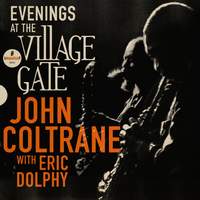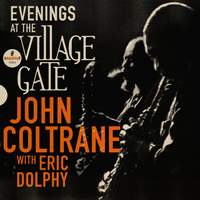Recording of the Week,
John Coltrane with Eric Dolphy - Evenings At The Village Gate

We don’t live long without witnessing new and exciting discoveries from the legacies of historic musical greats. Of course, we should count ourselves lucky to live in an age when, thanks to the cutting-edge digital audio preservation technology of today, the art of recovering sounds from the past is at all possible. Please don’t think me cynical, then, when I suggest that with each new archival release comes a marketing campaign that assumes all the inevitable glory of some mammoth archeological finding. For each sunken treasure that makes its way onto the jazz marauder’s map, the media are quick to prescribe accolades and soundbites beyond comparison which the product rarely deserves. So then, imagine my joy to be presented with a release that feels captivating, informative and honestly befitting of the effort put into its making, as we uncover a transitional phase in the careers of two of my favourite musicians: the fiery live pairing of John Coltrane and Eric Dolphy, appearing together in an evolutionary but short-lived quintet.

Retrieved from under the proverbial grandmother’s bed and cut simply for posterity’s sake, these recordings have finally been brought to light after decades spent gathering dust in the sound archives of the New York Public Library for the Performing Arts. The result captures a performance from Trane’s residency at the Village Gate (situated at the corner of Thompson and Bleecker Street where, thirty years on from the venue’s closure, a faded sign still hangs today – its bulbed veneer unlit yet seemingly immortal) that took place in 1961 just a few months prior to an almost mythical stint at the Village Vanguard in November of the same year, in an album which AllAboutJazz describes as being “among the most exalted of Impulse!'s new-millennial Coltrane releases.” High praise indeed, given a posthumous career that has recently involved the discovery of classic quartet recordings, including the previously-lost Both Directions at Once (1963/2018), the soundtrack album, Blue World (1964/2019) and Live at the Half Note: One Down, One Up (1965/2005).
This sort of glowing reception has not always been the case for Trane, however – particularly during his own lifetime, it’s worth mentioning – as this recording highlights a performance from an era that brought much turmoil for one of the most iconic figures of 20th-century jazz. In fact, critics and lay audiences alike found themselves fraught with animosity in opposition to the challenging and experimental nature of the performer’s content at the time. Contemporary listeners in 1961 no doubt would have stumbled across a review in DownBeat referring to his music made in collaboration with Dolphy as "anarchistic" and "a horrifying demonstration of what appears to be a growing anti-jazz trend." This comes as no surprise, given the most up-to-date impression of the saxophonist would have been his signature tune which, at that time, had more sooner been associated with the warbling role of a young Austrian nun.

It's impossible to contextualise this newly-released recording, or any live performance from this era onwards, for that matter, without taking into account Coltrane’s transformative rendition of that unmistakable Rodgers & Hammerstein standard, 'My Favourite Things' – which, thanks to radio airplay, had become something of a minor hit with the American public. This popular number served as the perfect backdrop for Trane to impose his remarkable modal framework upon, which was shaking the world of jazz composition at the time. With subtly nourishing vamps that alternate from minor to major (and then back again) interspersed with the main theme’s waltz-like melody, a concrete foundation is laid for an unravelling stream of whirling harmonic ideas, underpinned of course by the great pianist, McCoy Tyner, matched by the dynamite arrhythmic pulsations of Elvin Jones on drums. It’s a tune that would serve Trane through to the very end, wildly reimagined over and over up until his final frantic performances in 1967 – by which time, he knew his days were numbered as he battled in vain against liver cancer before succumbing later that summer.
All of the material we are fortunate enough to glean from this epoch (be it studio album, live recording or otherwise) offers a glimpse of Coltrane as an artist in the midst of a supremely creative flux. With prominent sessions and extensive residencies falling in rapid succession of one another throughout the early sixties, each of these engagements provided Trane with the potential to further develop his startling vision and technique. It was during this period, in fact, that he refined his appreciation of the soprano saxophone; its appearance in the artist’s hands on the album cover of My Favourite Things (1959) would have been striking in itself, due to the instrument’s large absence from modern jazz – and that’s before we even consider the experimentation his sound was about to undergo!
Two immensely talented multi-instrumentalists, the duo’s cross-disciplinary approach can be felt as they both run riot, tearing up the bandstand in their wake with every opportunity. Neither of the pair comes across all these years later as overbearing; each frontman relishes his chance to lead the dialogue, yet always does so with an outward consideration for the wider conversation taking place. Even as Trane and Dolphy pepper their soli with a volley of wild behaviours that push each of their instrumental registers beyond its uppermost extremities, the rhythm section are never far behind… they only serve to embolden the maelstrom of sound as they keep up in endless pursuit. From their initial bebop beginnings to the newer and unfamiliar avant-garde sensibilities they were introducing to their live act, it is the adventurous and playful nature of the co-leaders on this recording that truly sets it apart from other such audible relics.
Available Formats: CD, MP3, FLAC, Hi-Res FLAC, Hi-Res+ FLAC




